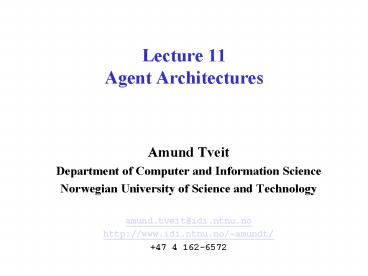Lecture 11 Agent Architectures PowerPoint PPT Presentation
1 / 20
Title: Lecture 11 Agent Architectures
1
Lecture 11Agent Architectures
- Amund Tveit
- Department of Computer and Information Science
- Norwegian University of Science and Technology
- amund.tveit_at_idi.ntnu.no
- http//www.idi.ntnu.no/amundt/
- 47 4 162-6572
2
Regarding project!
- CVS repositories will be created tonight (after
this lecture)
3
Lecture Outline
- What is an agent architecture (internal)
- Abstract Agent-Architecture
- Deliberative Architectures
- Reactive Architectures
- Project help
4
What is an agent architecture?
- Represent the move from specification to
implementation - E.g. after or in the late steps of Gaia
- How to construct computer systems that satisfy
the properties specified by agent theoritists - What software structures are appropriate?
5
Definitions of Agent Architecture - I
- Pattie Maes
- A particular methodology for building agents. It
specifies how the agent can be decomposed into
the construction of a set of component modules
and how these modules should be made to interact.
- The total set of modules and their interactions
has to provide an answer to the question of how
the sensor data and the current state of the
agent determines the actions .. and the future
internal state of the agent. - An architecture encompasses techniques and
algorithms that supports this methodology
6
Definitions of Agent Architecture - II
- Kaelbling
- A specific collection of software (or hardware)
modules, typically designated by boxes with
arrows with arrows indicating the data and
control flow among the modules. - A more abstract view of architecture is as a
general methodology for designing particular
modular decompositions for particular tasks
7
Abstract Agent Arch. Overview
- Environment states
- S s1, s2, ...
- Actions
- A a1, a2, ...
- Agent ?? Function
- Action S ? A
8
(Non-)Deterministic Behavior
- Behavior of an environment can be modelled as
- env S x A ? ?(S)
- if ?(S) sx, sy
- ? non-determistic, dont know which state action
leads too - if ?(S) sx
- ? deterministic, can only go to one state
- Interested in agents whose interactions with
environment doesnt end (e.g. infinite)
9
Behavior Abstract Agent Arch.
- Start initial state s0
- Observe the environment of state s, and generate
a perception see(s) - Internal state of agent is updated via next
function next(i0,see(s)) - Action selected is then action of Internal state,
action(next(i0,see(s))) - Action is performed and goes into a new cycle,
goto 2
10
Types of Agent Architectures
- Deliberative Agent Architectures
- Based on symbolic AI
- Explicit symbolic model of the world
- Decisision methods
- Logical Reasoning
- Pattern matching
- Symbolic manipulation
- Reactive architectures
- No central symbolic representation of world
- No complex reasoning
- Hybrid architectures
- Mix of Reactive and Deliberative architecture
11
Deliberative Architectures
- Early systems
- Planning Systems (STRIPS)
- Logistics-related (e.g. Room planning at
University) - Symbolic description of World
- Desired goal state
- Set of action descriptions
- Find a sequence of actions that will achieve goal
- Use very simple planning algorithms
- Very inefficient planning
12
Deliberative Architectures
13
Reactive Architectures
- Brooks
- Intelligent Architectures can be generated
without explicit symbolic (AI) representation - Intelligent behavior can be generated without
explicit abstract symbolic reasoning (AI)
mechanisms - Intelligence is an emergent property of certain
complex systems - Effect of combined components gt effect of each
component times number of components - Real intelligence is situated in the real
world, not in disembodied systems such as theorem
provers or expert systems - Intelligent behavior arises as a result of an
agents interaction with its environment
14
Features of Reactive Architectures
- Reactivity is a behavior based model of activity
?? symbol manipulation model used in planning - Components of Perception
- Semantics of agents input
- A set of static facts (knowledge base)
- A specification of state transitions
- Actions specified by semantics of output
(reaction) - All symbolic manipulation is done a compile time
15
Reactive sub-sumption Architectures
16
Reactive Architecture Example
- Robots objective
- explore a distant planet (e.g. Mars), and more
concretely, collect samples of a particular type
of precious rock - If detect obstacle then change direction
- If carrying samples and at the base the drop
samples - If carrying samples and not at the base, go to
base - If detect a sample then pick up sample
- If true then move randomly
17
Layered Architectures
18
Exercise!
- Discuss with your neighbour for a few minutes
- What type of internal agent architecture is best
for the Peer-to-peer project? - Deliberative ... Or ... Reactive?
19
Exercise!
- Discuss with your neighbour for a few minutes
- What type of internal agent architecture is best
for the Weather project? - Deliberative ... Or ... Reactive?
20
Project Help ? 1515-1700
- If people have questions regarding the project
- Installation and use of FIPA-OS
- Use of supporting packages, e.g.
- JDBM for data storage
- Regular expressions for handling of data
- Network programming
- .. Other java-related stuff
- Other issues related to the project
- Which computer languages etc.

